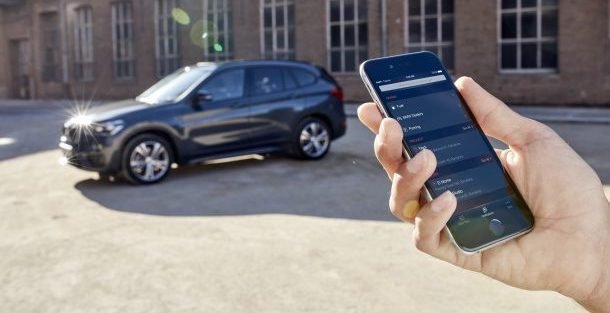More automakers working to turn your smartphone into a shareable digital car key

The smartphone killed the phone book, audio player, the pocket digital camera, handheld GPS devices and voice recorders. Now that addictive, transistor-filled candy bar is coming for your car keys. The Car Connectivity Consortium (CCC) announced that it's unveiled Digital Key Release 1.0 Specification for its member companies, which is the first step in standardizing protocols. As of now, the potential is there for drivers to download a digital key that can lock and unlock the car, start it, and transfer the key to another operator in order to share the car.
The CCC's aim is to save development costs, stave off a glut of similar-yet-competing technologies, and create keys that reflect the expanded use cases for cars, i.e., car-sharing services and to-your-car delivery. Next year's Release 2.0 Specification will standardize an authentication protocol between the phone and the vehicle — how a digital key is generated on a secure server and transmitted to the car and the device — and "promise more interoperability between cars and mobile devices." The CCC says that "NFC distance bounding and a direct link to the secure element of the device" will assure security. We take that to mean the phone will need to be in direct contact with the vehicle, at least to open the door.
Carmakers and suppliers have been working on digital keys for years now, and the ecosystem for individual owners to open individual cars is growing. Audi showed off its Mobile Key at the 2015 Consumer Electronics Show, and now calls it Audi Connect Key, but we haven't seen much of it in the field. That same year, Volvo said it expected to sell cars with digital keys only by 2017, which clearly didn't happen. Last year, the head of sales at BMW asked, "Honestly, how many people really need [keys]? They never take it out of their pocket, so why do I need to carry it around?"
Even though a digital key offers an owner more convenience and long-distance control over their vehicle, car sharing is the target — and that can even include traditional rental cars. In 2013, Continental began testing a digital key in France, aimed at integrating and simplifying the electric-car-sharing business; everything from finding a free vehicle to driving it and charging it could be done on a phone.
A key could be programmed with the driver's information, so that any car the driver gets in will be automatically updated with that driver's preferences, say for audio or seating position. And since anything that contains your location and personal information will eventually be tracked for commercial purposes, some enterprising folks are already thinking about location-specific recommendations and coupons.
As a 2015 New York Times pieces laid out, hurdles such as security, privacy, transferability and cell coverage remain, so physical keys will also remain for the foreseeable future. Lest you think the world of digital keys won't be for you, though, the CCC says its 70-plus members cover "more than 70 percent of the world's auto market, more than 60 percent of the global smartphone market," and marquee aftermarket companies. Blue-chip names include Apple, Audi, BMW, General Motors, Hyundai, LG Electronics, Panasonic, Samsung, and Volkswagen, plus Continental, DENSO, NXP, and Qualcomm. We'll all be along for the ride, eventually.
Related News


